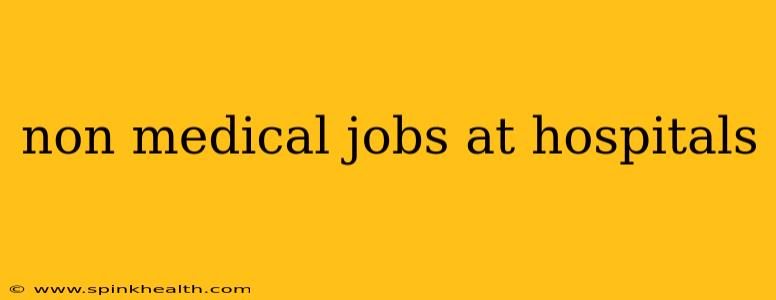Beyond the Stethoscope: Exploring Non-Medical Careers at Hospitals
The bustling atmosphere of a hospital often conjures images of doctors and nurses in scrubs. But behind the scenes, a vibrant network of non-medical professionals keeps the entire operation running smoothly. These individuals, often overlooked, are the unsung heroes who ensure patient comfort, maintain efficient systems, and contribute to the overall success of the hospital. This isn't just about cleaning or food service; it's a diverse landscape of fulfilling careers with ample opportunity for growth. Let's delve into some of these vital roles.
What are some non-medical jobs in a hospital?
This is a broad question, and the answer depends on the size and type of hospital. However, some common non-medical jobs include roles in:
- Administration and Management: Hospital administrators oversee daily operations, manage budgets, and ensure compliance with regulations. This can range from entry-level administrative assistants to high-level executives.
- Finance and Accounting: Hospitals, like any large organization, require skilled financial professionals to manage budgets, track expenses, and ensure financial stability.
- Information Technology (IT): Hospitals rely heavily on technology for patient records, medical imaging, and communication. IT professionals maintain these systems, troubleshoot problems, and implement new technologies.
- Human Resources (HR): HR professionals recruit, hire, train, and manage hospital staff, ensuring a positive work environment and compliance with employment laws.
- Marketing and Public Relations: Hospitals often need professionals to manage their public image, build relationships with the community, and promote their services.
- Food Service: Providing nutritious and appealing meals for patients and staff is a crucial part of hospital operations, requiring skilled cooks, dieticians, and food service workers.
- Environmental Services (Housekeeping): Maintaining a clean and hygienic environment is essential for patient health and safety, making housekeeping and sanitation a vital non-medical role.
- Security: Hospital security personnel are responsible for ensuring the safety and security of patients, staff, and visitors. This involves patrolling the premises, monitoring security cameras, and responding to emergencies.
What are the job prospects for non-medical hospital jobs?
Job prospects for non-medical hospital jobs are generally good, particularly for skilled professionals in IT, finance, and administration. The healthcare industry is a large and growing sector, and hospitals are always in need of qualified individuals to fill various support roles. However, competition can be fierce for certain positions, especially those requiring specialized skills or advanced degrees.
What are the benefits of working in a non-medical hospital job?
Working in a hospital setting offers a unique blend of benefits. Many hospitals offer competitive salaries and benefits packages, including health insurance, retirement plans, and paid time off. The work is often meaningful, contributing to the well-being of patients and the overall success of the hospital. Moreover, the opportunities for professional development and advancement within the organization are significant.
What skills are needed for non-medical hospital jobs?
The skills needed vary greatly depending on the specific job, but some common requirements include:
- Strong communication skills: The ability to communicate effectively with colleagues, patients, and visitors is crucial in most hospital settings.
- Problem-solving skills: Many hospital jobs require the ability to quickly assess and resolve problems.
- Teamwork skills: Hospital staff often work collaboratively to provide the best possible care for patients.
- Organizational skills: The ability to stay organized and manage multiple tasks simultaneously is essential in many roles.
- Computer skills: Familiarity with various computer programs and systems is often a requirement.
What education or training is required for non-medical hospital jobs?
Educational and training requirements vary widely. Some roles require only a high school diploma or equivalent, while others may require a bachelor's or even a master's degree. Specific training may also be required for certain positions, such as medical billing and coding or IT support.
This is just a glimpse into the vast world of non-medical jobs at hospitals. From maintaining the technological infrastructure to ensuring financial stability, these roles are just as essential as the medical professionals themselves. If you're looking for a career that is both challenging and rewarding, consider exploring the diverse opportunities available within a hospital setting.

